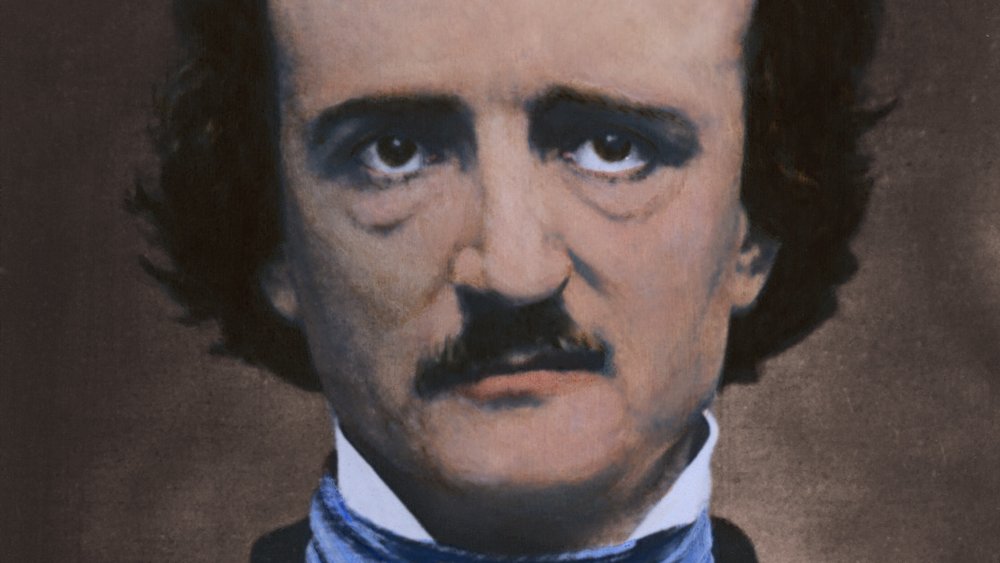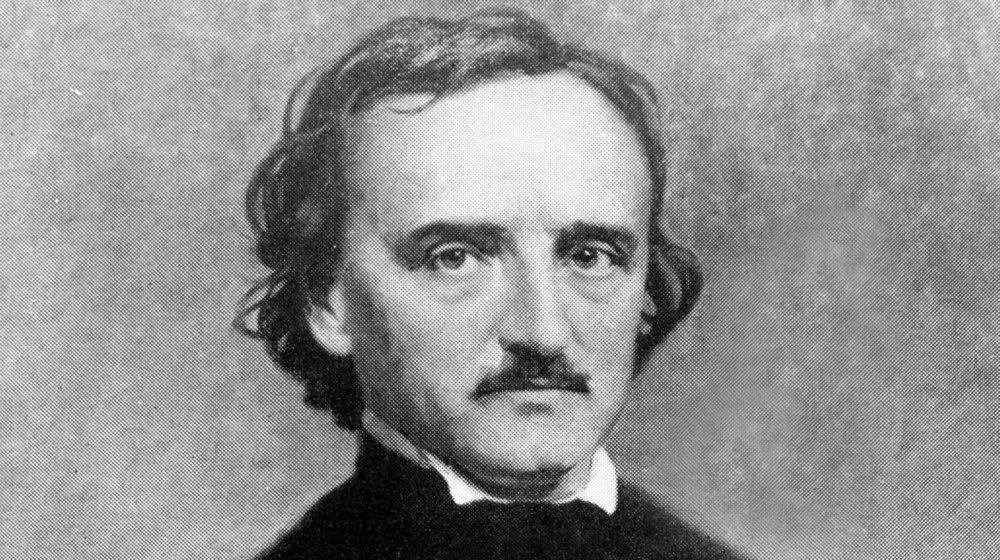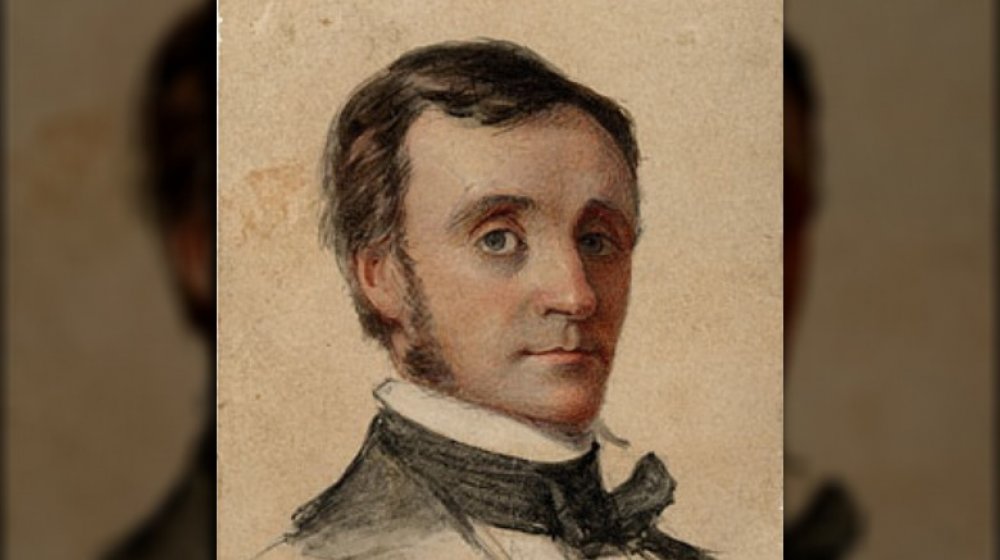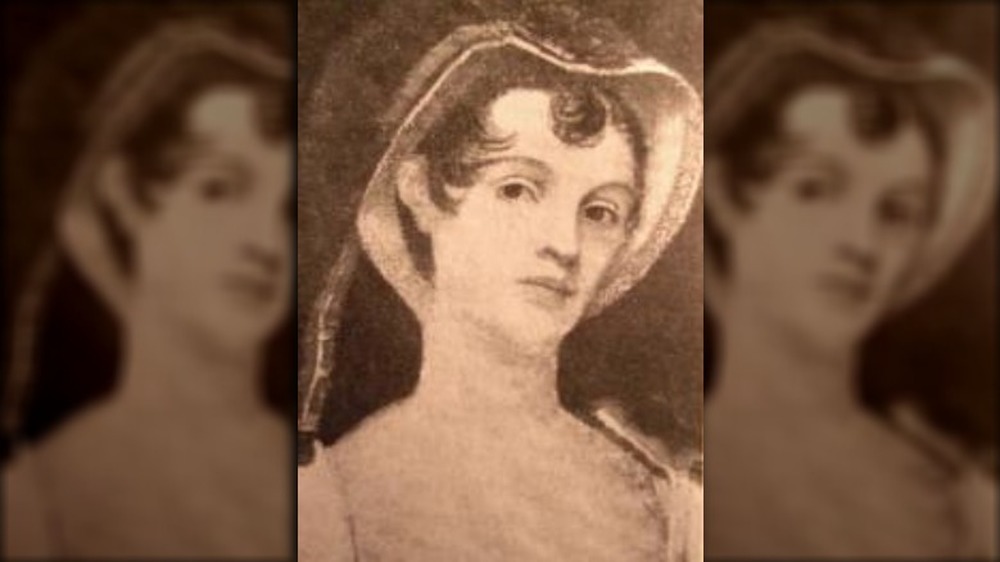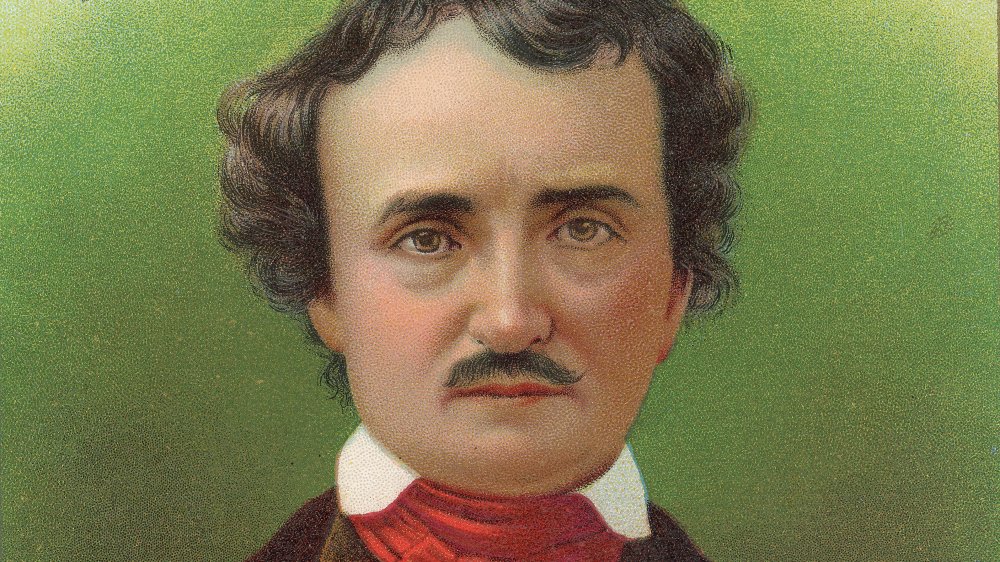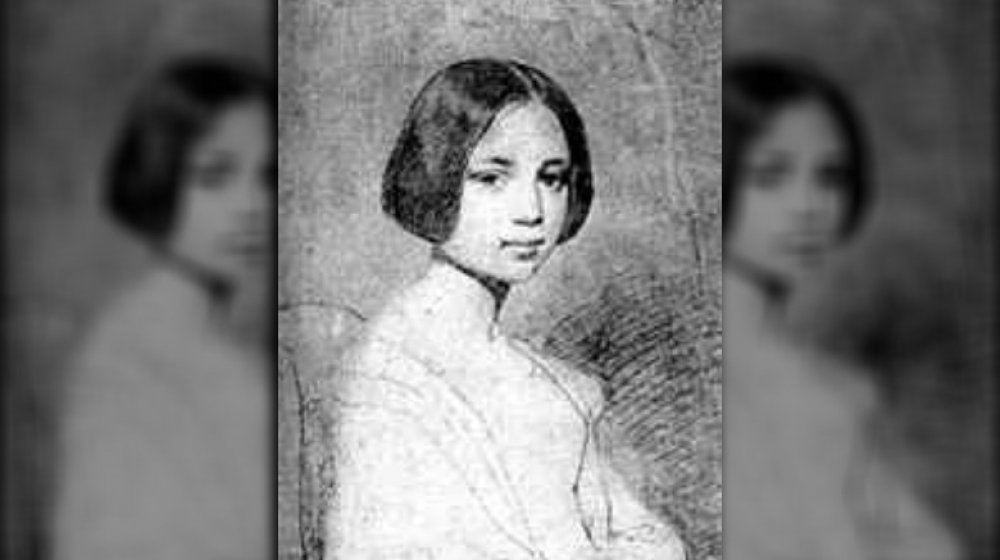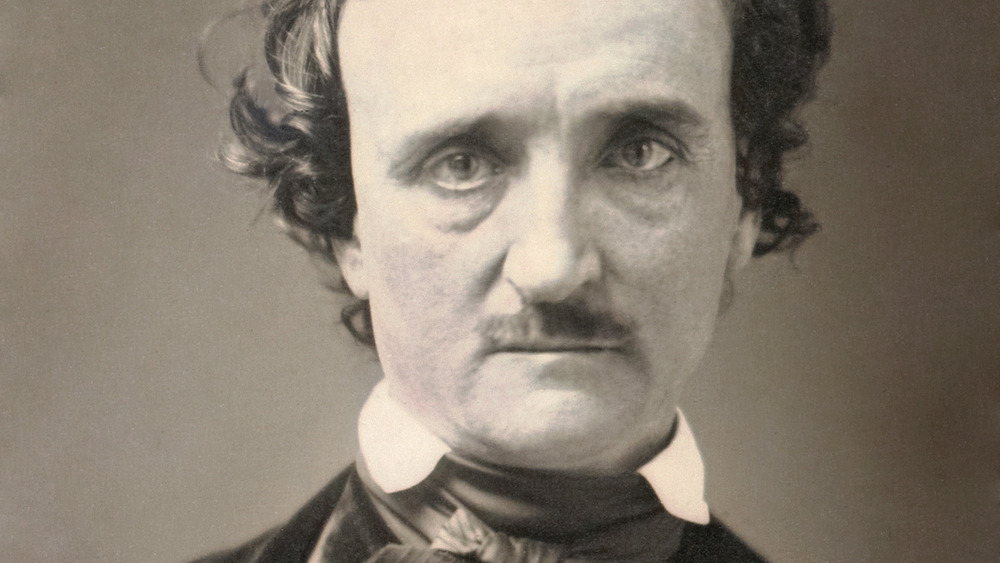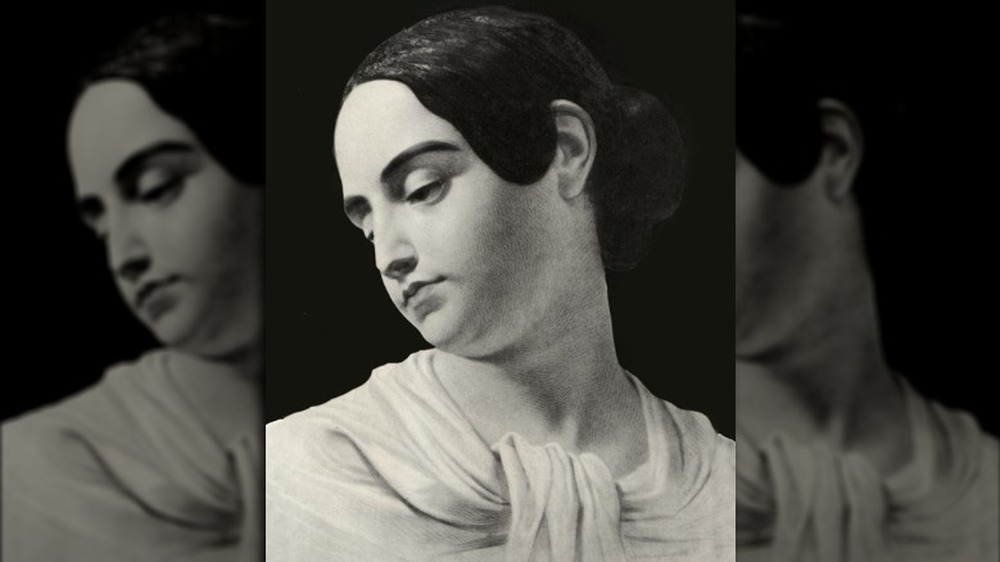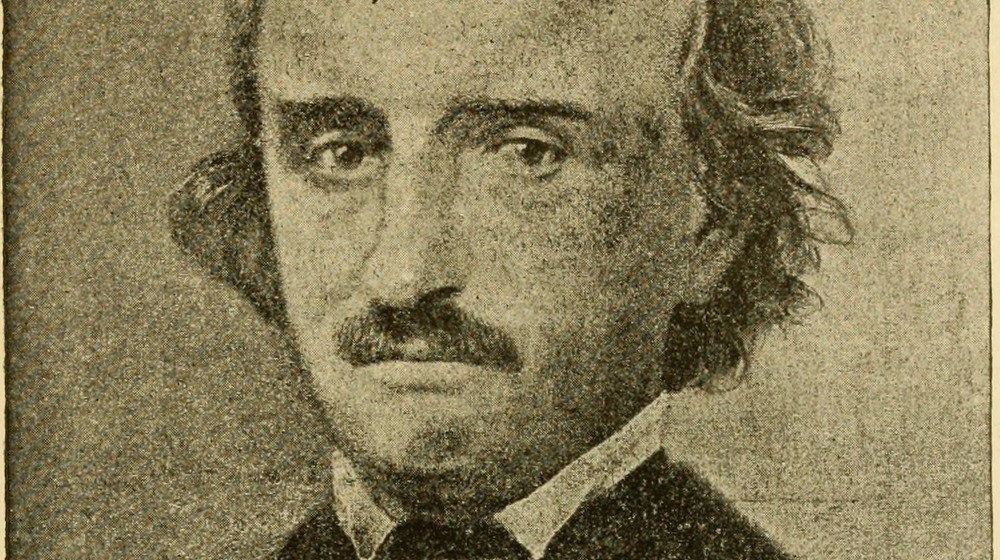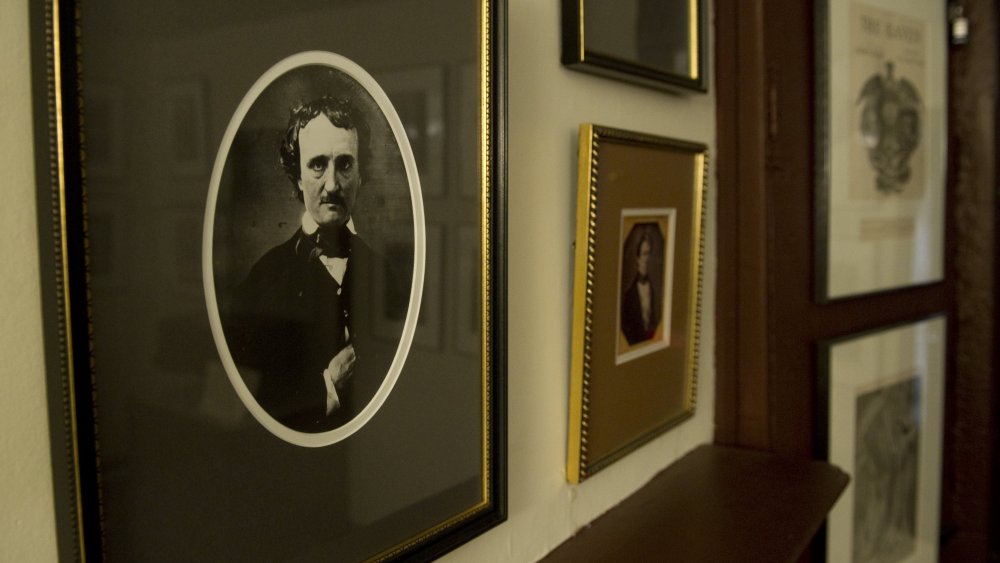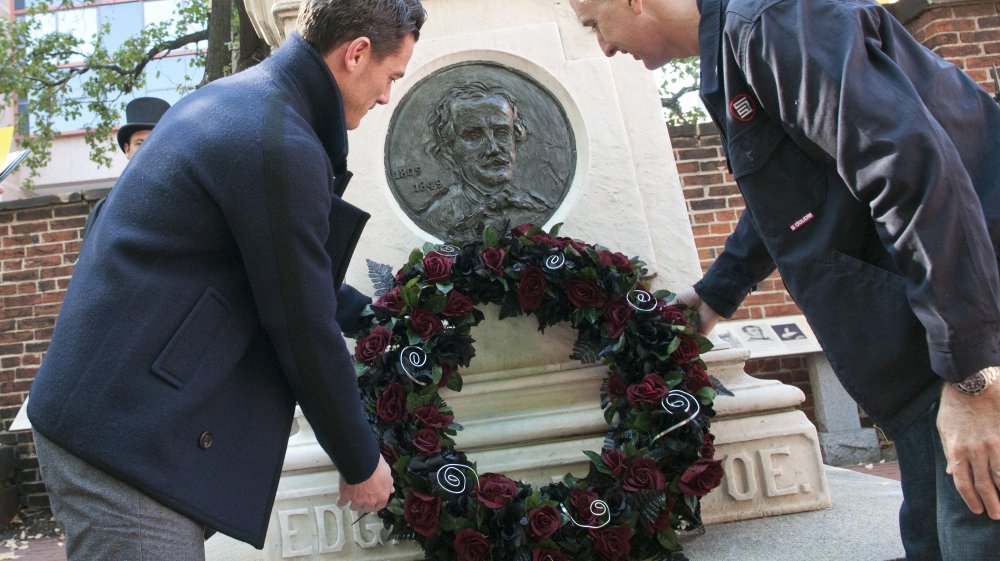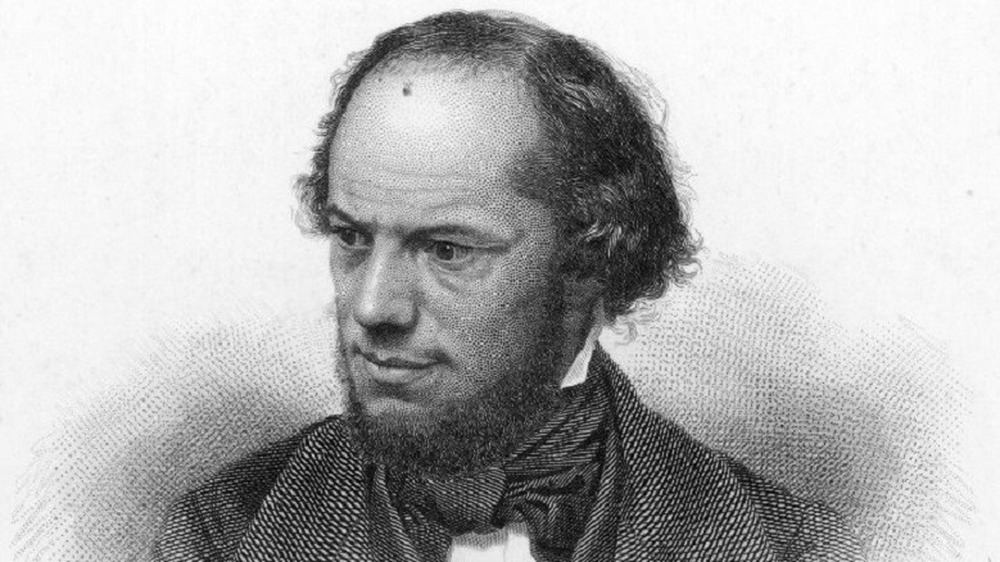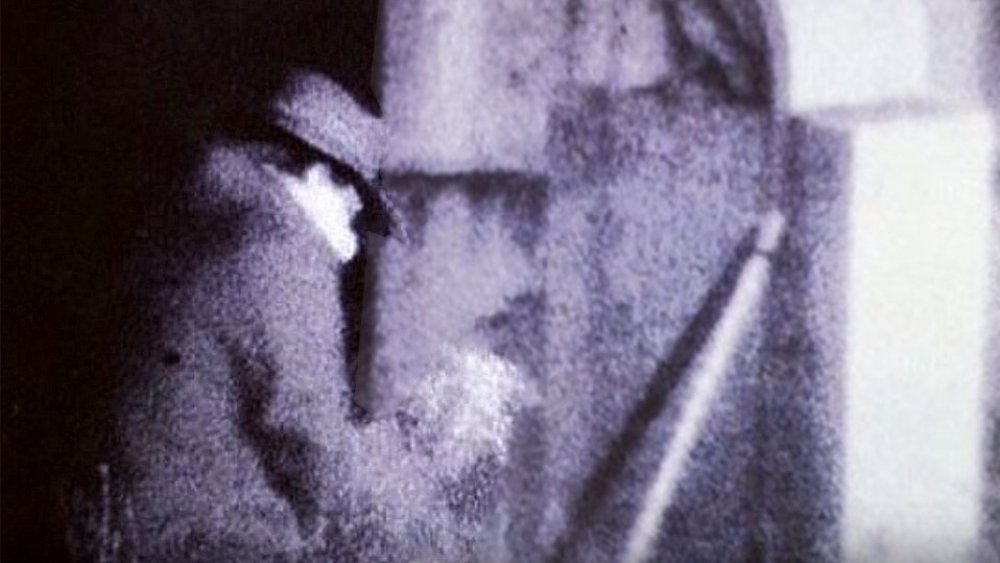The Tragic Real-Life Story Of Edgar Allan Poe
In all of American literature, there might be no master of the macabre so celebrated as Edgar Allan Poe. From his unforgettable, supernatural-tinged poem "The Raven" to the haunting twist at the core of "The Tell-Tale Heart," Poe's style and themes form the crux of almost all horror stories today. He knew how to create believable characters, place them in eerie settings, and leave the reader feeling chilled to the core. Millions of writers owe him a debt of gratitude.
Behind the cloak and daggers of Poe's tales, though, what was the real man like? While it would be nice if the person who wrote such scary fables could have had a happy time on Earth, the record shows that Poe's short life was instead filled with constant tragedy, heartbreak, and an enemy who tried to ruin his reputation. The real Edgar Allan Poe was quite different from the legend, but no less worthy of study.
Edgar Allan Poe was orphaned at a young age
In 1809, a boy named Edgar Poe — note, no "Allan" — was born to two traveling stage actors, as reported by the Edgar Allan Poe Society of Baltimore.
The father was David Poe, Jr., who hailed from a hardcore military family so entrenched in their ways that David had to refer to his dad as "General," according to Dr. Shelley Costa Bloomfield. Needless to say, these folks weren't happy when Junior fell in love with the talented thespian Eliza Arnold, nor when he followed her onto the stage for his own artsy career. Once married, the couple had two sons: William and Edgar. The latter boy was named after a character in Shakespeare's play King Lear, which the couple was performing at the time.
Sadly, David wasn't a good father. His struggles with heavy drinking, fighting, and financial hardship were stressful enough, but he also may have also resented Eliza's far more successful acting career. Whatever his problems may have been, he deserted his family, leaving Eliza alone to raise the children. By the time young Edgar was 3-years-old, Eliza came down sick and died. Apparently, David died soon afterward, though the circumstances of his demise are unknown. Regardless, this left the young children with no parents, and no safe place to go.
Edgar Allan Poe had a horrendous adoptive father
Edgar Poe was soon adopted by the Allan family: hence, he became Edgar "Allan" Poe. Unfortunately, while he got along well with his adoptive mother Frances, the thorny connection to his new dad John Allan proved to be a source of conflict, misery, and heartbreak for much of Poe's life.
Allan, a wealthy tobacco merchant, wanted Poe to follow him into the family business, according to Biography, and was thus highly dismissive of Poe's literary passions. Poe, in turn, rebelled by writing poems on the back of Allan's business papers. The relationship further soured as Poe grew older, as seen in letters preserved by the National Park Service, when Allan repeatedly refused to lend Poe necessary financial assistance — despite frequent, desperate pleading from Poe — leading to the academically successful boy being unable to afford his classes, falling deep into debt, and becoming increasingly destitute. Allan, for his part, seems to have been remarkably dismissive of the boy's concerns. He once wrote Poe off as "quite miserable, sulky & ill-tempered," and bizarrely touted how magnanimous he'd been for paying for Poe's education even though he was the one whose lack of support, in fact, had caused Poe's hardships. Not the kind of guy you want as a dad, that's for sure.
It's worth noting that, despite taking Poe in, Allan never legally adopted the boy. This spiteful move caused deeper rifts down the line.
Edgar Allan Poe was in a 'Stacy's Mom' situation
Due to the fact that Poe was so horribly young when his mother perished, he spent much of his early years trying to connect with substitute mother figures, the most notable being his foster mother Frances Allen. According to the Edgar Allan Poe Society of Baltimore, another of these was Jane Stith Stanard, the mother of his friend Robert, though it has been speculated — with notable evidence — that Poe, when he was going through puberty, may have developed deeper feelings for her. When situations turned stressful at the Allan household, as they often did, it was Stanard whom Poe would go to for support, and while obviously no true romantic relationship could ever form — this was, at its core, a teenage crush — Poe did have enormous love and respect for her: in addition to writing a poem that subtly compared her to Helen of Troy, Poe would, years later, describe her as "the first, purely ideal love of my soul."
Sadly, as would happen to so many close people in Poe's life, Stanard died from illness at a young age, in 1824. Poe was still merely a teenager.
Edgar Allan Poe's military career
When Edgar Allan Poe was drowning in debt, starving, and receiving no aid from John Allan, he turned to a last-ditch solution: according to Mental Floss, he took the false identity of Edgar A. Perry, claimed to be a 22-year-old Boston clerk, and signed up for a five-year stint with the U.S. Army.
Poe excelled in the military. He also hated it. After two years of moving up and down the East Coast, making $5 a month, and being promoted to sergeant major for artillery, Poe was desperate for a way out, and confessed his true story to his commanding officer. Miraculously, the officer was okay with letting Poe out early ... but, not-so-miraculously, he stipulated that Poe had to first make amends with his obnoxious adoptive father. Ugh.
Undeterred, Poe began writing letters to Allan. Allan, being the jerk he was, didn't respond. However, the death of Frances Allan forced the two men to reconcile, at which point Allan agreed to let Poe leave the service early ... so long as he enrolled at West Point, the United States Military Academy. Sigh. Poe did as was asked, and excelled in his studies, but when Allan remarried, Allan shut down communication with him. Poe wanted out of military life for real this time, but once again, he needed Allan's express permission to leave, and Allan wouldn't give it. So Poe solved the problem by flunking his studies, being as insubordinate as possible, and purposely getting himself kicked out of West Point.
Edgar Allan Poe had an on-again/off-again romance
Perhaps the most continual thread running through Edgar Allan Poe's love life, from beginning to end, was a woman named Sarah Elmira Royster Shelton. She was, essentially, Poe's first and last love. Unfortunately, the two never married, and their relationship always hit some, well, snags.
Sarah and Edgar were childhood friends and neighbors, according to the National Park Service, who became engaged as teenagers. When Poe left to attend the University of Virginia, the two star-crossed lovers continued with an epistolary romance ... which came to a crashing halt when Royster's father caught wind, according to the Odyssey. James Royster did not want an orphan like Poe as a son-in-law, most likely, so he intercepted their letters and left both kids thinking the other had ghosted them. When Poe returned home, perhaps hoping to reunite with her, he instead found that she had married a wealthier man in his place. Many have speculated, based on this sad tale, that Sarah may be the long lost Lenore mentioned throughout "The Raven."
However, their romance didn't end there. When Royster Shelton's husband died in 1848, Poe reached out to her again, and they rekindled their romance. His initial (or, well, second) proposal was rebuffed, but a few months later, she accepted. Tragically, the wedding bells never rang out, because 10 days before the wedding, Poe died.
Edgar Allan Poe was the classic 'starving artist'
When you hear about famous artists who, despite changing the world, struggled to catch a break, well, Edgar Allan Poe should be near the top of the list. Despite Poe's magnificent talent, and a fierce desire for success, he spent much of his life in poverty, and his work was consistently undervalued. According to Mental Floss, his first poetry collection, Tamerlane, ended up being a financial disaster, which probably wasn't helped by his unwise decision to use the pseudonym "A Bostonian." His second book, Poems, only got off the ground when Poe convinced at least 131 fellow cadets in the Army to give him a buck and a quarter to get it running. Even when he was shopping for a publisher for his landmark poem, "The Raven," the Vintage News says that one magazine not only rejected it, but gave Poe $15 in sympathy cash. When he finally sold the poem to The American Review, it netted only $9.
Fortunately, "The Raven" made Poe mainstream enough to live as a professional writer. He became a household name, according to the Poe Museum, gave lectures, and ran his own magazine. Not so fortunately, his personal life was a mess — the health of his wife, Virginia, worsened by the day — and his finances weren't particularly sturdy. According to the Edgar Allan Poe Society of Baltimore, his annual salary totaled $624. With inflation in mind, that's equivalent to under $20 grand, in today's economy.
Quoth the raven, 'Nevermore'
Death happens. Haunting as it may be, it's quite ordinary. It's the inevitable conclusion to every life story. That said, the sheer number of tragic, heartbreaking deaths that Edgar Allan Poe faced in his life — to say nothing of his own death — were far more than ordinary. Looking past the early deaths of his parents and Mrs. Stanard, another tragedy in the young Poe's life was the loss of his foster mother, Frances, who loved him like John Allan didn't. According to the Edgar A. Poe Calendar, Poe was completely unaware of her failing health, and when she died, the Army discharged him so late that he missed the funeral.
Years later, Poe's first wife passed away due to fatal complications from tuberculosis, according to Biography, which was the same disease that killed his mother and his brother. Another incident that particularly stung was the death of John Allan. After all those years of feuding, Allan elected to leave Poe with no inheritance, while instead providing for an unknown child, born out of wedlock, who Poe had never met, despite the fact that Poe was, at this time, living broke and penniless.
Was Edgar Allan Poe an alcoholic or a drug addict?
Needless to say, Edgar Allan Poe had a hard life. He suffered from a lack of unconditional love, a troubled upbringing, and no reliable support system. Because of these struggles, according to Britannica, he often turned to alcohol, particularly when dealing with stressful social situations that required him to be in a good mood around people. While it's impossible to properly diagnose someone who lived hundreds of years ago, it does seem likely that Poe was an alcoholic. He drank more often than his peers, and while he didn't usually reach the point of being inebriated, his drunken instances always seemed to occur, embarrassingly enough, on the public stage.
However, the reality of Poe's very genuine suffering is often clouded by the false stories told by those who disliked him. Poe's enemies often tried to paint him as a town drunk, a drug addict, or someone who only wrote under the influence of chemical stimulants. None of these things were true, according to the Edgar Allan Poe Society of Baltimore: as far as drugs go, Poe only seems to have occasionally used opium for medical purposes, as was common in that time, and once claimed to have taken drugs as part of a suicide attempt. So either way, while Poe may have been an alcoholic, he absolutely was not a drug addict.
Only the good die young
Edgar Allan Poe was only 40 when he died, less than two weeks away from marrying his beloved Sarah. He was young, destitute for much of his life, criticized by his peers, and often unhappy.
Perhaps the most troubling thing about Poe's death, though, is that the circumstances remain a mystery. A week beforehand, according to Biography, his fiancée expressed concerns about his health, and his doctor told him not to travel. He did, anyway. Strange lapses in Poe's behavior occurred at this time — for example, he completely misplaced his luggage, and was unable to find it — until he was suddenly discovered sprawled out in the gutter outside a voting booth location, according to the Smithsonian, wearing someone else's clothes, unable to move, and screaming at hallucinations. During this pained time, he repeatedly called out for some unknown figure named "Reynolds," and died four days later.
What happened? As History explains, many people were quick to blame alcohol, but his attending physician disputed this. Various diseases have been suggested, such as tuberculosis and brain lesions. One of the most prevalent theories, due to the voting booth location where Poe was found, is that he may have been a victim of something called "cooping," a horrifying voter fraud scam from the time: cooping occurred when corrupt politicians paid criminals to drug and poison innocent bystanders, particularly the homeless, and then forced them to vote at location after location until they dropped dead.
Edgar Allan Poe couldn't catch a break even in death
Sadly, Edgar Allan Poe's mistreatment did not cease after his death.
According to Biography, his funeral was hastily conducted only a day after his death, resulting in only seven people attending, one of whom had nothing but nasty words about the author. Initially buried in an unmarked grave, it took 11 years for Poe's cousin to purchase a real monument for him, but before the piece could be mounted, it was destroyed when ... uh, a speeding train came off its rails, and crashed directly into the stone carver's place of business. Can't make this stuff up. It took nearly three decades before an assembly of students and teachers collected the funds to give Poe the monument he deserved, and even then, his coffin accidentally shattered to pieces during the transfer. Seriously?
It was around this same time that, finally, Poe's deceased wife was buried beside him: until that point, her remains had been placed in their landlord's family cemetery, which had subsequently been built over by developers. Since then, thankfully, both of them have remained in their rightful place.
Edgar Allan Poe's biggest hater shaped his legacy
Much of the darker Edgar Allan Poe legends and myths that circulate today, sadly, stem not from the writer's life, but his obituary. This mean-spirited block of text was penned by the Reverend Rufus Griswold. The not-so-holy man wrote this obituary under the pen name Ludwig, and he made sure it was filled with outright slander that portrayed Poe as being the drunken, drug-addicted, unsavory character that many still paint him as today.
Griswold, as one might imagine, had a personal reason for besmirching the dead, as explained by the Poe Museum. Over the years, the two men had gone back and forth between being friends, enemies, and literary rivals, and Poe's public critiques of Griswold's work, when he was running his magazine The Messenger, did not go forgotten. Now, in the 21st century, any writer should be advised not to get antsy about negative reviews: they happen, and it's okay. Griswold, though, was such a bitter little man that he followed his nasty, deceptive obituary an equally nasty, deceptive biography about Poe's entire life.
Ironically, Griswold's portrait of Poe as a dark, disturbed figure ended up increasing his enemy's posthumous fame, while Griswold himself has now become a mere footnote in literary history ... which is, frankly, an appropriate fate for such a major-league jerk.
Edgar Allan Poe has not been forgotten
In life, Edgar Allan Poe did not receive the full recognition he deserved. In death, though, he has been hailed as America's Shakespeare, according to American Heritage Trees, and many of the lies that "Ludwig" spread about him have been publicly dismissed. There are museums and societies dedicated to Poe's life, and works like "The Pit and the Pendulum" were probably your favorite stories that you studied in high school English.
Perhaps the most amazing tribute to Poe's legacy was the example set by an anonymous person identified as "the Poe Toaster." From 1948 until 2009, according to the Smithsonian, this masked figure rose from the shadows once a year, on the anniversary of Poe's birthday, to leave a bottle of cognac and three red roses on the author's grave. Who was the Poe Toaster? Nobody knows. The Poe Toaster never sought fame or attention, even as an increasingly large crowd of onlookers began taking note of his annual ritual, and it is believed that the original Toaster may have actually retired in 1999, passing the mantle down to his son.
The 2009 end of this tradition, it is speculated, may be due to increased media attention. These days, frankly, all grand mysteries tend to get killed by Twitter and Facebook. That said, this tradition has been continued by the Maryland Historical Society, who now send their own Poe Toaster to the author's grave every year, to pay their respects to one of dark literature's greatest champions.
